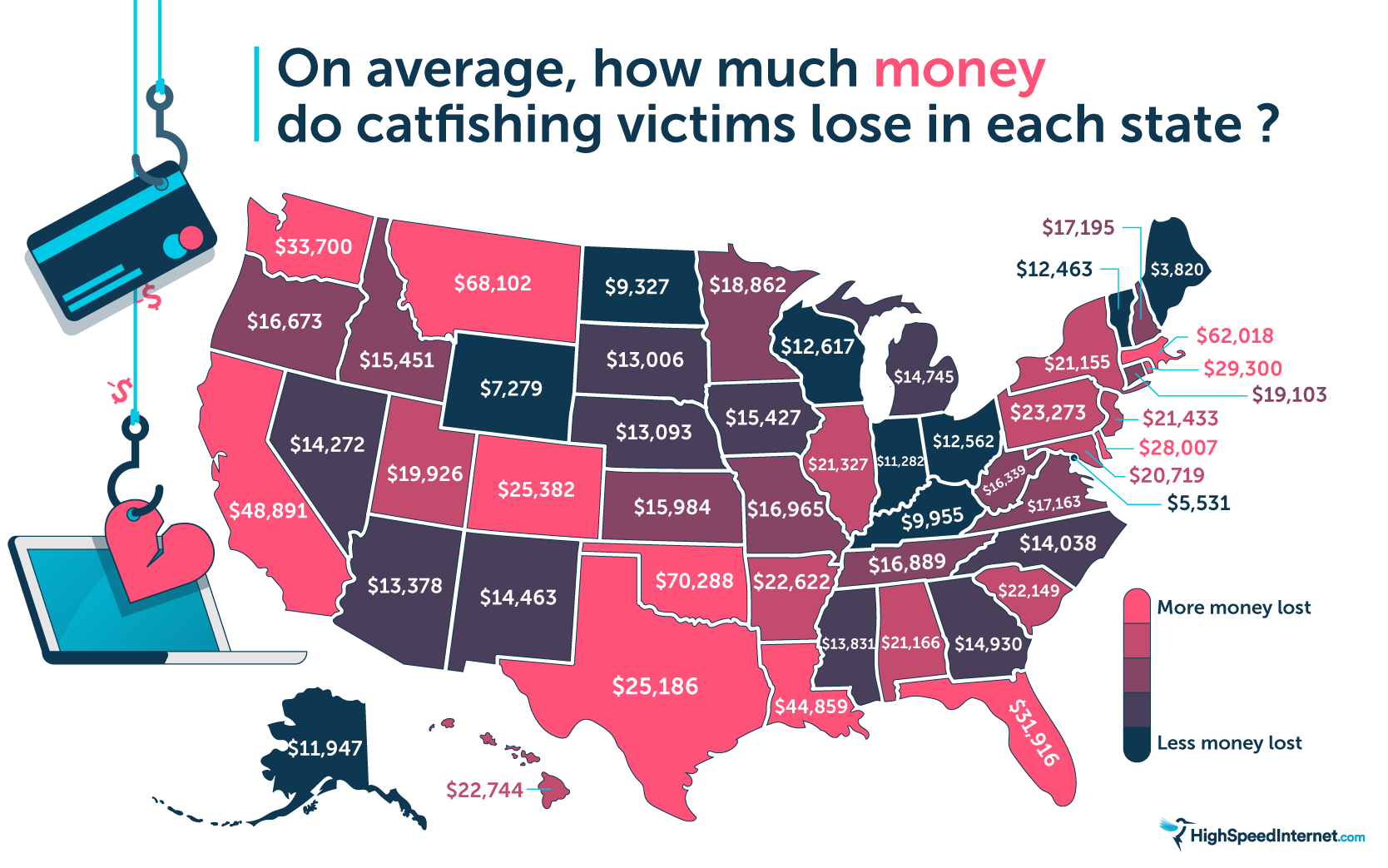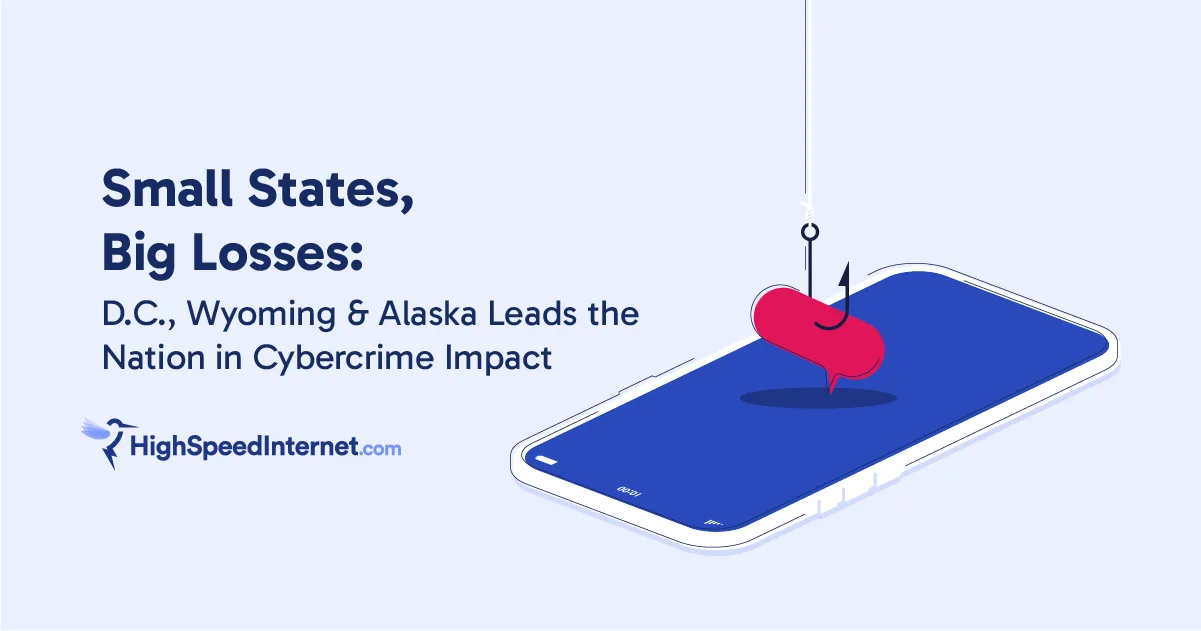This Is Where You’re Most Likely to Be Catfished in the USA in 2020
Aug 3, 2020 | Share
Industry Exclusive/Entertainment
In 2019, catfishing scams cost Americans a reported $475,014,032, which rose $11,513,271 from the previous year, according to the FBI.1 With a surge in online dating activity following the pandemic and an FBI warning for an increase in potential romance scams, it’s an excellent time to make sure your money doesn’t end up in a bottomfeeder’s cash bucket.2,3
So which states have the biggest problems with catfishing—and which have the least? We looked at FBI and Census data to determine your likelihood of being scammed in romance.4
How often do people get catfished in your state?
Lookin’ for love way out West? Six out of ten of the states where you’re most likely to be catfished fall in the western half of the US: Nevada, Wyoming, Washington, Utah, Alaska, and Oregon.
The non-western states with the highest rates of catfishing are New Hampshire, Minnesota, Florida, and Maryland.

States where you’re most likely to be catfished
- Nevada
- Wyoming
- Washington
- Utah
- Alaska
- New Hampshire
- Minnesota
- Florida
- Oregon
- Maryland
States where you’re least likely to be catfished
- South Dakota
- Mississippi
- Iowa
- Lousiana
- Maine
- Kansas
- Vermont
- Nebraska
- Ohio
- North Carolina
Compared to their western counterparts, people in the Midwest and South seem better clued into the catfishing scams—or perhaps the West is better about reporting?
States with the most dollars lost per victim
- Oklahoma – $70,288 per victim
- Montana – $68,102 per victim
- Massachusetts – $62,018 per victim
- California – $48,891 per victim
- Louisiana – $44,859 per victim
- Washington – $33,700 per victim
- Florida – $31,916 per victim
- Rhode Island – $29,300 per victim
- Delaware – $28,007 per victim
- Colorado – $25,382 per victim
States with the least dollars lost per victim
- Maine – $3,820 per victim
- D.C. – $5,531 per victim
- Wyoming – $7,279 per victim
- North Dakota – $9,327 per victim
- Kentucky – $9,955 per victim
- Indiana – $11,282 per victim
- Alaska – $11,947 per victim
- Vermont – $12,463 per victim
- Ohio – $12,562 per victim
- Wisconsin – $12,617 per victim
In terms of cost per victim, the top three states could all buy a self-driving dual-motor AWD Tesla Cybertruck and still have some change left over to go on some fancy dates.
Meanwhile, Maine has the lowest cost of $3,820 per victim, which is what we’ve all spent at some point on flowers and chocolates anyway—right?
The past few years have been rough for dating: the number of victims per 100,000 residents rose 52% from 2015 to 2019. With the way things are going in 2020, we wouldn’t count on that number dropping either.
How to avoid catfish online
Love hurts, but so does losing a bunch of money to an online scam. When you’re looking for the right one, there may be plenty of fish in the sea, but here’s how you can avoid a catfish:
Spotting a catfish
“A good rule of thumb is that if it seems too good to be true, it is,” says Heinrich Long, a Privacy Expert at Restore Privacy.
Experts warn to be wary of the following catfishing characteristics:
- They appear to be unbelievably attractive, single, rich, or “have a great job.”
- They ask you for money.
- They seem evasive or avoid giving details about life, family, etc.
- They claim to be from another country, promise to visit, but always have something come up to keep you from actually meeting them.
Whether you’ve already spotted a catfish, or you’re still trying to figure out if someone you met online can be trusted, here are some helpful tips to avoid getting burned.
- Keep conversations inside online apps until meeting in-person to prevent disclosing more personal info.
- Never reveal information susceptible to identity-theft such as banking information, or common security questions like maiden names, childhood pets, or where you were born.
- Never send money to people you haven’t met in person.
- Trust your gut, and don’t get too romance-happy until meeting in-person.
- Try reverse searching their images using Google or other tools.
- File a police report if they ask for money (or you’ve already sent it).
- Block them and stop responding to their messages.
There are many ways a catfish can try to rob you of your money, time, or effort. You can learn more about online romance scams from the Federal Trade Commission, FTC, or more catfishing tips from the BBB.
Methodology
We used data from the FBI’s 2019 Internet Crime Report, which included the total reported incidents per state. We combined this with US Census Bureau’s 2019 population estimates to calculate the number of crimes per 100,000 residents.
Confidence/Romance Fraud as defined by the FBI: A perpetrator deceives a victim into believing the perpetrator and the victim have a trust relationship, whether family, friendly or romantic. As a result of that belief, the victim is persuaded to send money, personal and financial information, or items of value to the perpetrator or to launder money on behalf of the perpetrator. Some variations of this scheme are romance/dating scams or the grandparent scam.7
- Internet Complaint Center, Federal Bureau of Investigation, “Annual Reports | 2019 State Reports,” Feb, 2020. Last accessed July 13, 2020.
- Socialcatfish.com, “Online Dating During the Coronavirus Has Gone Viral” 2020. Last accessed July 29, 2020.
- “FBI Warns of Money Mule Schemes Exploiting the COVID-19 Pandemic — FBI,” April 6, 2020. Last accessed July 29, 2020.
- US Census Bureau, “U.S. and World Population Clock,” Last accessed July 13, 2020.
- Eric Vanman, The Conversation, Phys.org, “We asked catfish why they trick people online—it’s not about money” July 26, 2018. Last accessed July 29, 2020.
- Aisha Harris, Slate.com, “Catfish meaning and definition: term for online hoaxes has a surprisingly long history,”January 18, 2013. Last accessed July 29, 2020.
- Federal Bureau of Investigation, “2019 Internet Crime Report,” Feb, 2020. Last accessed July 29, 2020.
Author -
Trevor's written professionally for five years for editorial publications and retail/e-commerce sites. He lives in Salt Lake City and enjoys photography and making music in his spare time, or you can catch him on your local dance floor bustin' a move.
Editor - Bison Messink
Bison Messink is the managing editor of HighSpeedInternet.com and is excited to help connect people to one of the vital resources of modern life: an internet connection. He's spent his career in digital media as a news reporter, blogger, and editor, and he was previously the executive editor at Thrillist. He has a master's degree in writing from the University of Wyoming, and he's experienced the fastest and slowest of internet connections while living in Laramie, Michigan, New York City, Buenos Aires, and Utah.





